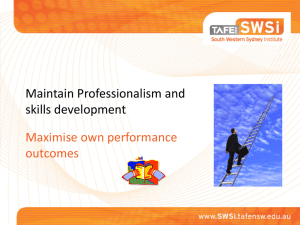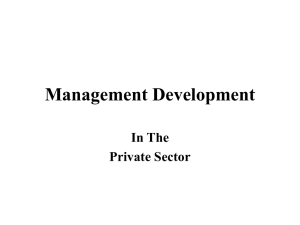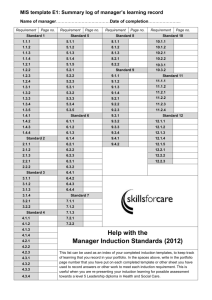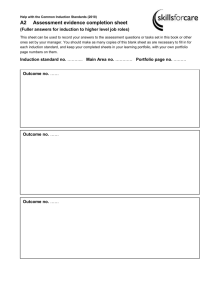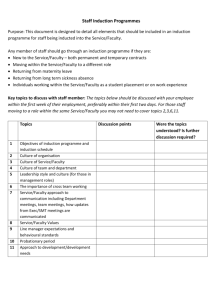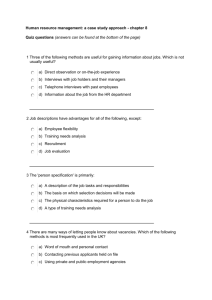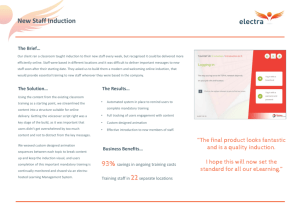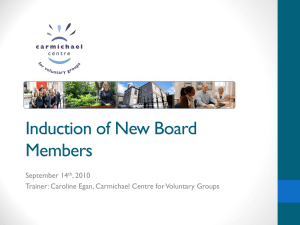WK 2 rECRUITMENT,INDUCTION AND
advertisement
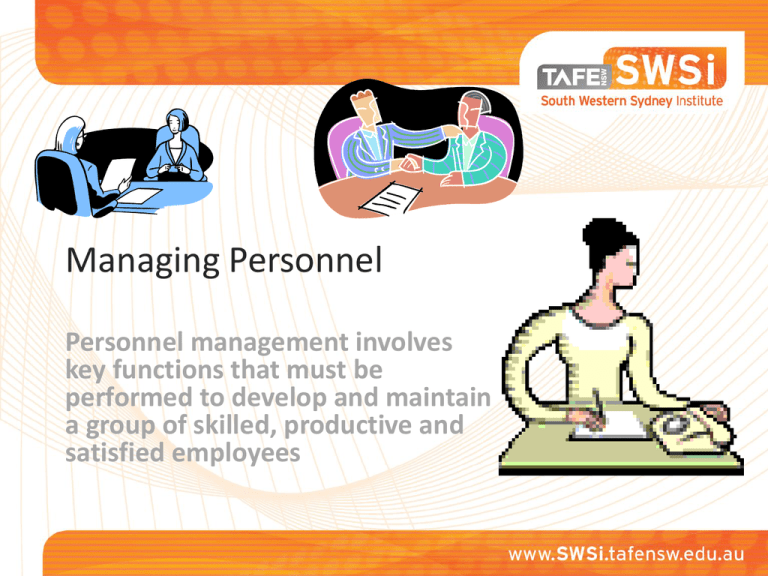
Managing Personnel Personnel management involves key functions that must be performed to develop and maintain a group of skilled, productive and satisfied employees Key Functions • Recruiting, screening and selecting personnel • Specifying and allocating job tasks to deign position descriptions and staffing patterns and requirements • Designing and conducting performance appraisals • Orienting ,training and developing staff • Supervising and coaching • Handling employee performance problems • Enforcing employees sanctions ,when necessary Steps in Recruitment • Identify the job • Understanding the relevant award and other legal conditions affecting the job • Seeking applicants for the job • Preparing to interview applicants • Deciding who to interview- short-listing • The interview • Reference checking • Inform successful and unsuccessful applicants • Induction of new employee • Review of process Job Description and Selection Criteria • The job description describes the role, what it does, how it does it and reporting requirements • The related selection criteria describes the skills, knowledge, experience, qualifications and personal attributes that a candidate needs in order to meet the requirements of the job description • The selection criteria should also clarify whether these competencies are essential or desirable • For the organisation, job descriptions provide the basis for not only recruitment but also performance apprasail and for ensuring the work carried out by staff is aligned with the organisations objectives Information sheet • http://ncoss.org.au/projects/msu/downloads/ resources/information%20sheets/15_Recruit mentBestPractice.pdf Competencies • A Competency can be defined as any • Knowledge • Skill or • Attribute observable in the individual’s behaviour interactions and work related activities over time which contributes to the fulfilment of the mission statement and strategic directions of the organisation Common Competencies • Organisation and priority setting- Prioritises, organises and monitors work to ensure that goals, objectives and commitments are met • Flexibility – Adapts well to changes in direction, priorities, schedule and responsibilities • Two –way communication- Clearly expresses ( verbally and in writing) , thoughts, feelings, concepts and directions, listens effectively to understand communication from others Competencies cont’d • Teamwork. - Works collaboratively and cooperatively in group for the purpose of achieving shared objectives ,consistent with the organisation’s mission and strategic plan. • Relationship –building- Builds and maintains relationships with others who share a mutual interest in and commitment to achieving agency’s strategic objectives • Valuing diversity – Is sensitive and competent in working with people from diverse backgrounds Competencies cont’d • Critical thinking and judgement – Gathers ,organises, interprets and processes information for the purpose of making informed decisions in the course of accomplishing work objectives • Technical expertise – Demonstrates technical knowledge relevant to role – Framework for assessment of job applicants Induction of Staff • Orienting and inducting staff to the agency is a way of planning to maximize staff performance • By using an effective induction policy and procedure is a way of ensuring that new workers are successfully integrated into the workplace • A new employee represents a considerable investment of time and cost for your agency therefore a well planned induction program will ensure that the new employee contributes as quickly as possible Induction cont’d Should include: • Appointment of another employee to support new worker • A folder with: • • • • • • • • Organisational Chart Job description Copy of business/strategic plans A list of key external contacts Annual report Induction timetable with clear priorities Times for staff meetings, management meetings and any rosters Job contract Induction cont’d • Work Hours • Supervision and staff appraisal, training development • Policies and procedures manual • Provided desk, chair, phone, computer, diary, etc • Show how to operate photocopier, computer, fax, postage, email, lights, alarm, etc • Briefed on the administration systems including filing system, petty cash, expenses, travel, etc • Letter of welcome from management Induction cont’d Within the first week the new staff member will attend a staff meeting where the agenda will include: • A formal welcome • What each person is responsible for • What the new person is responsible for • Challenges facing the organization the near future • Time for questions by the new staff Responsibilities of staff member • To ask questions about the job and the organization • To take time to read reports and materials about the agency • To ask for any resources needed for the job • To learn the office policies and procedures Responsibilities of Manager • To arrange a Buddy and ensure that they prepare the new staff member’s work space and are ready to meet them on arrival • To prepare the contract of employment for new staff • To tell the new staff in advance working hours • To convene the meeting for all staff where the new staff member will be welcomed • To check on the new staff member after a few days to address any early concerns Staff Training and Development Goals of Training: • Main goal is to match the skills, knowledge and development activities of staff to the agency needs. • To provide opportunities for staff development and encouraging staff to expand their knowledge and skills and as a result improve service to its clients. Formal and Informal training • Formal Training is a planned, structured activity with clear, measurable outcomes linked to the goals of the organisation • Informal training or on-the-job training as it is sometimes called is where people learn by doing the job. • The distinction between formal and informal training is important in relation to the Training Guarantee legislation which only recognises formal structured training. Benefits of Training • Make the organisation more productive and successful • Motivate employees • Provide employees with additional skills • Help in the induction process for new employees • Provide opportunities for promotion and developing an employee with the agency so that they don’t feel they have to leave to get new employment opportunities • Increase customer service • Help meet occupational health and safety Managing the staff development process Staff development program management includes • Scanning the environment for social policies, innovations and consumer feedback that could influence the service delivery and administrative functions of the agency • Analysing the agency as an organisation for issues and /or problems that affect either the delivery of services or the administrative supports of such services Managing the staff development process cont’d • Assessing the training needs of all staff • Planning, managing and evaluating programs that are based on the integration of the data gathered from the scanning, analysing and assessing activities (Austin, Brannon & Pecora, 1984) How do I know if training is needed? • • • • • • • • • Shortage of skills or people Undue internal friction Inadequate numbers of “promotable” employees Unsatisfactory production records Excessive number of grievances Unsatisfactory safety record Poor punctuality and attendance record Increase in union activity High labour turnover How can I tell training is cost effective? You can work out the cost effectiveness of a proposed training program following the following steps: 1. Define your objective or problem you are trying to address 2. Put dollar values on the benefit to be gained from resolving problem 3. Design which of the following options are feasible: – In-house training – External training – No action – Outside consultants – Recruitment – New equipment – Job restructure 4. Compare costs of feasible options 5. rank the options on the basis their likelihood of success 6. Decide on best option overall Performance Appraisals Definition: The processes of identifying, evaluating and developing employee work performance so that organisation’s aims and objectives are met as well as benefiting employees through recognition. Performance feedback, catering for work needs and offering career guidance. Why Performance management? • It provides a clear and accurate structure in which staff can set goals in lines with the objectives included in the Agency’s Strategic Plan. • It provides a venue in which staff can receive regular feedback, management, support, training and development. • Should be ‘based on clearly specified, realistic and achievable criteria ,reflecting agency standards’ (Kadushin, 1991) Cont’d • Encourages supervisors and workers to set realistic and measurable goals for job performance • Measurable evaluation criteria also helps to motivate, direct and intergrate worker learning while providing staff with examples of how they can evaluate their own performance Performance Criteria Most performance criteria fall into the following general categories • Output quality • Output quantity • Work habits and attitudes • Accident rates • Learning ability • Judgement or problem-solving ability (Howell & Dipboye,1982) Stages of Performance Management Plan • • • • • Developing the Workplan Developing the Training Plan Conducting Progress review Annual Performance review Decisions flowing from the performance review • Appeals/grievance Process • Restrictions General Principles • Staff involvement in choosing an appraisal system and establishing or modifying evaluation criteria, will increase commitment to the process and clarify expectations. • Focus of the evaluation should be on worker performance rather than worker as a person • Appraisal method and criteria should be formulated with some consistency across both workers and supervisors Principles cont’d • Should be a continuous process rather than one- off or occasional event • Time to prepare prior to the formal evaluation built into the supervision program • Needs to occur within the context of a positive working relationship • Both worker strengths and area for improvement should be reviewed in a way that is fair and balanced Cont’d • The appraisal conference ,should be carefully planned, requiring adequate time and a conducive environment free from unnecessary distractions • Evaluation procedure should be a mutual, shared process with worker participation encouraged, but with both taking some responsibility for reviewing the evaluation form and preparing an assessment • Confidentiality of the process needs to be assured Information Sheets • http://www.ncoss.org.au/projects/msu/downl oads/resources/information%20sheets/18_m anaging_staff_performance.pdf • http://www.ncoss.org.au/projects/msu/downl oads/resources/information%20sheets/19_an nual_perfor.pdf • http://www.heartharmony.com.au/document s/epr/EmployeePerformanceReviewForms.pdf
